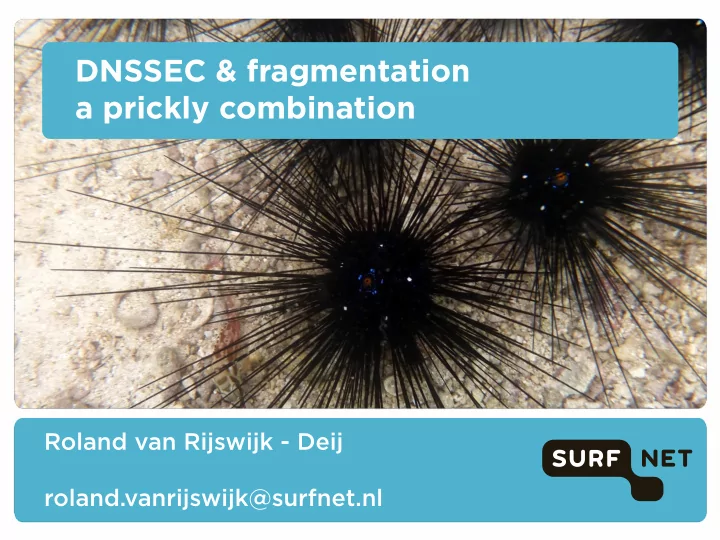

DNSSEC & fragmentation a prickly combination Roland van Rijswijk - Deij roland.vanrijswijk@surfnet.nl
The problem in 1 slide Authoritative Name Server ➀ ➁ ➂ Firewall ➃ Recursive Caching Name Server (resolver) 2 SURFnet: we make innovation work
Extent of the problem •9% of all internet hosts may have problems receiving fragmented UDP messages [1]; •2% – 10% of all resolving name servers experience problems receiving fragmented DNS responses [2] [1] Weaver, N., Kreibich, C., Nechaev, B., and Paxson, V.: Implications of Netalyzr’s DNS Measurements. In: Proceedings of the First Workshop on Securing and Trusting Internet Names (SATIN), Teddington, United Kingdom, (2011). [2] Van den Broek, J., Van Rijswijk, R., Pras, A., Sperotto, A., “DNSSEC and firewalls - Deployment problems and solutions”, Private Communication, Pending Publication, (2012). 3 SURFnet: we make innovation work
The problem biting us for real •SURFnet deployed DNSSEC for surfnet.nl in 2010 (first secure delegation in .nl) •Within a week we had problems •Cause: largest ISP (2.5M users) in the country blocks fragments on service network edge •Helpdesk: “ SURFnet is doing something wrong ” :-( 4 SURFnet: we make innovation work
Solutions •Resolving name servers SHOULD advertise a proper max. response size to avoid fragmentation issues [RFC 2671BIS (DRAFT)]; Not explicitly stated in standards yet, nor widely implemented; •Until then: set maximum response size at some authoritative name servers 5 SURFnet: we make innovation work
Resolver experiments (1) Normal operations Response(>me((ms.)( 900$ 800$ 785$ 700$ 687$ 600$ Time((ms.)( 500$ 400$ 388$ 381$ 300$ 281$ 200$ 150$ 109$ 105$ 100$ 83$ 0$ Windows(Server(2012( Unbound( BIND( 6 SURFnet: we make innovation work
Resolver experiments (2) Blocking fragments Response(>me((ms.)([0/5(altered(Authorita>ve(Name(Servers]( 6.000% Time x10 (!) [24,195;12,167] 5.000% x̅=17,787 4.463% 4.000% Time((ms.)( 3.435% Time x2 3.000% 2.524% 2.000% Time x100+ (!!!) 1.175% 1.000% 760% 465% 0% Windows(Server(2012( Unbound( BIND( 7 SURFnet: we make innovation work
Resolver experiments (3) Max. resp. size on 1 authNS Response(>me((ms.)([1/5(altered(Authorita>ve(Name(Servers]( 6.000% Max. ¡= ¡16,162 5.000% 4.889% 4.000% Time((ms.)( 3.000% 2.126% 2.000% 1.169% 1.118% 1.000% 638% 173% 117% 109% 0% Windows(Server(2012( Unbound( BIND( 8 SURFnet: we make innovation work
Resolver experiments (4) Max. resp. size on 2 authNS Response(>me((ms.)([2/5(altered(Authorita>ve(Name(Servers]( 3.500& 3.295& 3.000& Time x10 Time x2 2.500& Time((ms.)( 2.000& Time x1.5 1.756& 1.500& 1.408& 1.036& 1.000& 651& 513& 500& 290& 126& 99& 0& Windows(Server(2012( Unbound( BIND( 9 SURFnet: we make innovation work
Experiment on live authNS Normal Max. response Tra ffi c (IPv4 + IPv6) Operations size 1232 bytes Fragmented responses 28.9% 0.0%* Fragment receiving resolvers 57.3% 0.0%* Truncated UDP responses 0.8% 0.9% ICMP FRTE messages 5649/h < 1/h* ICMP FRTE sending resolvers 1.3% 0.0%* Total retries 25.8% 25.5% *Statistically significant di ff erence between experiments 10 SURFnet: we make innovation work
Rise in truncated answers •Experiment: – Querying 995 zones in .com, .edu, .mil, .net and .nl – All zones are signed and have a www-node – Results: Max. response A for www AAAA for www DNSKEY 4096 0.0% 0.0% 0.0% 1472 1.8% 1.8% 8.1% 1232 2.9% 3.5% 40.0% – 30% truncations were expected for a maximum response size of 1232 bytes by Rikitake, K., Nogawa, H., Tanaka, T., Nakao, K. and Shimojo, S. “An Analysis of DNSSEC Transport Overhead Increase”, IPSJ SIG Technical Reports 2005-CSEC-28, Vol. 2005, No. 33, pp. 345-350, ISSN 0919-6072, 2005 11 SURFnet: we make innovation work
How to move forward? •Working on a recommendation in the RIPE DNS working group (http:/ /bit.ly/ripe-draft-frag) •Make sure your resolver(s) set the maximum response size to something that actually works! Learn how: http:/ /bit.ly/sn-dnssec-vali 12 SURFnet: we make innovation work
roland.vanrijswijk@surfnet.nl nl.linkedin.com/in/rolandvanrijswijk @reseauxsansfil Questions? Remarks? Read our blog: https:/ /dnssec.surfnet.nl/
Recommend
More recommend